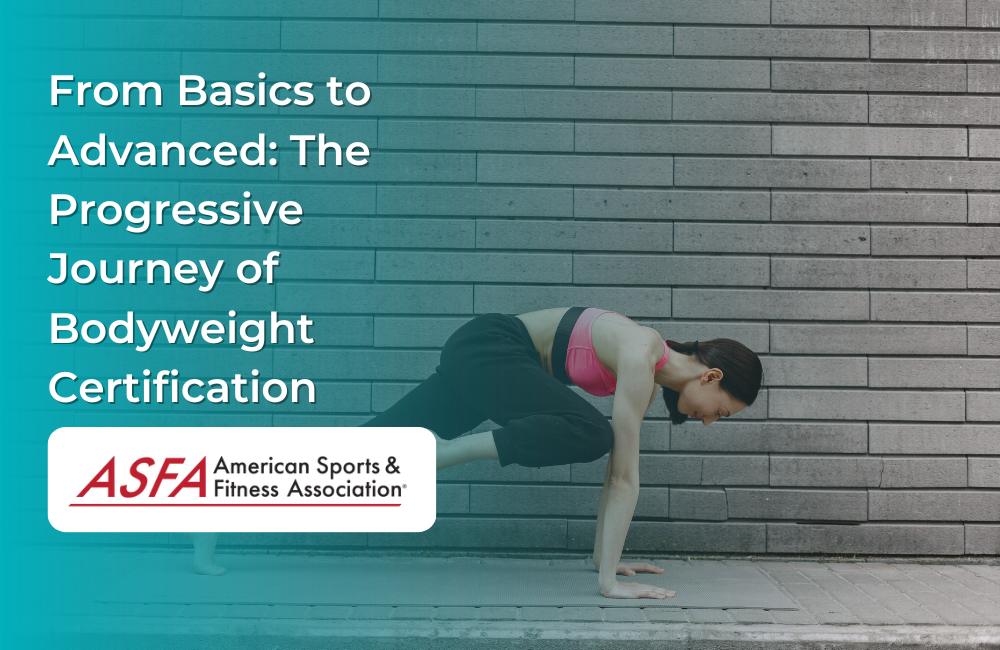Bodyweight training has evolved from simple exercises like push-ups and squats to advanced movements such as handstands and one-arm push-ups. To effectively teach and progress clients in this dynamic field, fitness professionals can pursue a progressive journey of bodyweight training certifications. In this blog, we will explore the importance of progressing through different levels of bodyweight certification, the benefits it offers, and how it enhances a trainer's ability to cater to clients at various fitness levels.
The Importance of Progressing Through Levels of Certification
- Comprehensive Knowledge: Each level of bodyweight certification builds upon the previous one, providing trainers with a deeper and more comprehensive understanding of bodyweight exercises and progressions.
- Skill Development: Progressing through different levels allows trainers to develop their skills progressively, mastering the basics before tackling advanced movements.
- Safety: A progressive approach ensures that trainers can teach exercises with proper form, reducing the risk of injury for their clients.
- Client Adaptation: As trainers advance through certifications, they gain the expertise to adapt exercises and progressions to meet the unique needs and fitness levels of each client.
- Marketability: Holding certifications at different levels demonstrates a commitment to professional development and makes trainers more marketable to a wider range of clients.
The Progressive Journey of Bodyweight Certification
Level 1: Foundation
- Focus: Basics of bodyweight exercises, fundamental movement patterns, and safety considerations.
- Examples of Exercises: Push-ups, squats, planks, basic mobility drills.
- Benefits: Trainers acquire a strong foundation in bodyweight training, suitable for beginners and those new to fitness.
Level 2: Intermediate
- Focus: Progressions of foundational exercises, more advanced movements, and programming principles.
- Examples of Exercises: Pull-ups, pistol squats, handstand progressions, and circuit training.
- Benefits: Trainers gain the knowledge and skills to work with clients at intermediate fitness levels and design diverse workouts.
Level 3: Advanced
- Focus: Mastery of advanced bodyweight exercises, intricate progressions, and specialized training techniques.
- Examples of Exercises: One-arm push-ups, muscle-ups, handstand push-ups, and advanced bodyweight flows.
- Benefits: Trainers become experts in advanced bodyweight training, suitable for athletes and clients seeking challenging workouts.
Specialization: Targeted Populations
- Focus: Tailoring bodyweight training for specific populations, such as seniors, athletes, or individuals with mobility limitations.
- Examples of Specializations: Senior fitness, sports-specific training, injury rehabilitation using bodyweight exercises.
- Benefits: Trainers learn to adapt bodyweight training to meet the unique needs of different clients.
Enhancing Trainer Adaptability
Progressing through levels of bodyweight certification equips trainers with the adaptability to work with clients at various fitness levels, from beginners to elite athletes. This adaptability is essential for:
- Client Engagement: Trainers can design workouts that align with the current fitness level and goals of each client, keeping them motivated and challenged.
- Injury Prevention: By tailoring exercises to a client's capabilities, trainers reduce the risk of injury and ensure safe and effective workouts.
- Results: The ability to progress or regress exercises based on a client's performance allows trainers to optimize results and track progress.
The progressive journey of bodyweight certification empowers fitness professionals to become experts in this versatile and effective training method. By starting with a solid foundation and gradually advancing their knowledge and skills, trainers can provide clients with safe, challenging, and tailored bodyweight workouts that cater to their unique fitness levels and goals. Whether you're a personal trainer, group fitness instructor, or a fitness enthusiast, embarking on this journey of certification can elevate your expertise and help you make a significant impact on the fitness journey of others.





